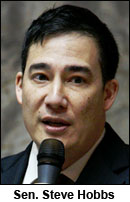OPINION
Dem-sponsored bill would limit school workers’ bargaining rights
By DAVID WESTBERG
OLYMPIA (Feb. 7, 2017) — In the latest of the national efforts to demonize public and educational employees, and following on the heels of similar anti-collective bargaining drives in Ohio, Wisconsin and Tennessee, Republicans in the “blue” State of Washington’s Senate have unleashed a number of legislative attacks on workers. They range from a clearly unconstitutional attempt to ban public employee unions from making political contributions to straight-up “Right to Work” (for less).
 But amid these Republican assaults against workers are two proposals (SB 5726 and 5727) to remove health benefits from the scope of collective bargaining for local K-12 school employees. Last year, the Republican sponsor of this failed proposal, Sen. Steve Litzow, lost his bid for re-election. But this year several Democrats, including the new prime sponsor Sen. Steve Hobbs (D-Lake Stevens), have taken up the mantle of these labor-opposed bills.
But amid these Republican assaults against workers are two proposals (SB 5726 and 5727) to remove health benefits from the scope of collective bargaining for local K-12 school employees. Last year, the Republican sponsor of this failed proposal, Sen. Steve Litzow, lost his bid for re-election. But this year several Democrats, including the new prime sponsor Sen. Steve Hobbs (D-Lake Stevens), have taken up the mantle of these labor-opposed bills.
These proposals couldn’t come at a worse time.
Thousands of low-income Washingtonians are potentially being cut off from their medical coverage by Congress. Legislators are struggling to comply with a State Supreme Court order in the McCleary case to fully fund public education — and the fines for their failure keep piling up. And in a state with the most regressive tax structure in the nation, the two political parties can’t agree on revenue reform to fix this.
But apparently, a small group of senators can agree to support costly new legislation to limit collective bargaining rights. The 2016 version had an estimated $190 million in fiscal costs to the state. The costs of setting up a new agency to administer state-controlled benefits are not funds that can be considered as (McCleary) “basic education.”
This idea has been around for 25 years and was included in proposed biennial budget in 2012 at the insistence of the legislative “Roadkill Caucus” of conservative Democrats. These were the Democrats who frequently sided with then-minority Republicans to seize control of that body and pare back unemployment, workers’ compensation and other benefits for workers.
SB 5726 and 5727, introduced on Feb. 3, would prohibit agreements on health benefits from local collective bargaining. Instead, school employees would be given token representatives on a statewide board that would purchase and provide benefits, and dictate point-of-service cost-sharing levels and premium costs for districts and employees.
Workers and their unions would have virtually no say in this. This board would be heavily weighted toward administration. School districts would be at financial risk for variations in enrollment, and most administrative services would remain the responsibility of individual school districts, including customer service, payments to carriers, audits and verifications. Plus it would mandate a significant increase in reporting requirements to the state Health Care Authority — with no funding for this work.
Today, education workers in certain high cost-of-living areas like Seattle have done a good job of negotiating for comprehensive health benefit plans in order to attract and retain qualified staff. But in other parts of the state, often the more rural areas, there are fewer offerings in the much-smaller market. Employees there may choose to negotiate for higher wages to compensate for higher out-of-pocket health costs.
 Taking the power to decide how to prioritize health benefits out of the hands of workers and giving it to a school district administration-dominated board is unfair and against what labor stands for.
Taking the power to decide how to prioritize health benefits out of the hands of workers and giving it to a school district administration-dominated board is unfair and against what labor stands for.
Plus, there are significant costs to this proposal. Although official estimates are not yet available, previous incarnations of this proposal included an additional $20 million to “start up” the system and another $25 million per year in additional costs to be paid by education employees through “cost sharing” and higher premiums.
But the highest cost will be paid by thousands of part-time educational employees who could lose health coverage all together because they can’t afford the mandatory premium cost-sharing. The plan proposes no compensation for low-wage employees who have bargained historically to trade away wage increases for decent insurance coverage. Now this may be taken from them. They may have no other option than to migrate to Medicaid to get benefits — shifting another cost to the state.
Dubbed the “Wisconsin Plan” for its similarities to the plan put in place by Wisconsin Gov. Scott Walker, the Washington proposal looks to bring higher costs, poor customer service and bigger government to school employees and has been opposed by AFL-CIO educational employee affiliates: Local 609 of the International Union of Operating Engineers, AFT Washington, the Teamsters union, Washington Education Association, and the Washington State Labor Council, AFL-CIO.
We urge that SB 5726 and 5727 be summarily rejected. Again.
 David Westberg is the Business Manager of the International Union of Operating Engineers Local 609, representing classified school employees across Washington state. For more information, visit www.iuoelocal609.org.
David Westberg is the Business Manager of the International Union of Operating Engineers Local 609, representing classified school employees across Washington state. For more information, visit www.iuoelocal609.org.





